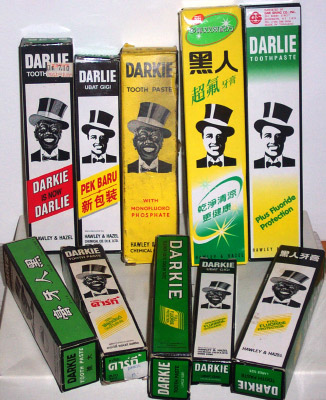
By Thomaschiou - Own work, CC BY-SA 4.0, Link.
With social issues like racism, cultures vary in their sensitivity. What is considered a serious infraction in one culture may raise hardly a ripple in another. This is an interesting case in point.
“Hawley and Hazel marketed Darkie toothpaste as a parody of an American minstrel performer, Al Jolson, who became popular for his blackface performances.” – Wikipedia
After Colgate-Palmolive took over 50% of Hawley & Hazel in 1985, there was an outcry over the racist name and imagery. Colgate-Palmolive changed the name to Darlie in 1989, and replaced the minstrel performer face.
What many English-speaking customers may not know, is that the Chinese name remained unchanged.
According to Wikipedia: “the Chinese name of the brand, ‘黑人牙膏’ (in English, ‘Black Person Toothpaste’), remains the same and a Chinese-language advertising campaign reassured customers that ‘Black Person Toothpaste is still Black Person Toothpaste’.”
The TV spot below promoting the English name change clearly stated that only the English name is changing.
Presumably, Chinese-speaking customers did not find the brand name racist. It can be argued that the Chinese name is more descriptive than derogatory. Given the origin of the English name and minstrel face, I would say the initial intent is dubious.
Of course, anyone can be racist; regardless of their race. In light of the recent Black Lives Matter protests worldwide, Colgate-Palmolive has announced a review on June 19, 2020. Let’s see how long it takes for the Chinese name to change, and for their Chinese-speaking customers to stop using the old name.